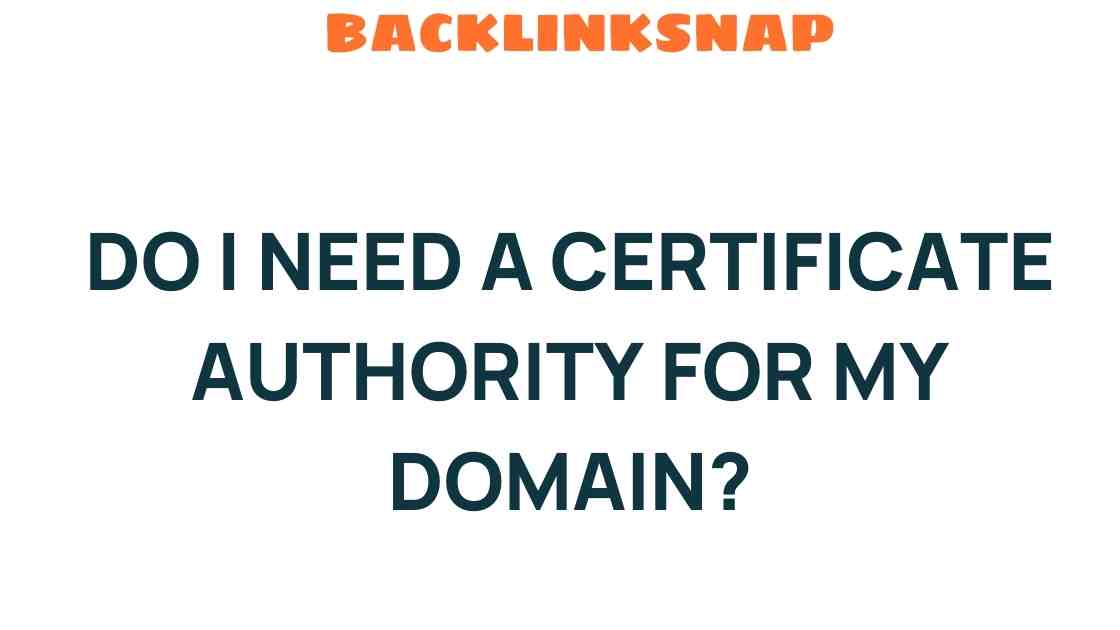Do I Really Need a Certificate Authority for My Domain? Unraveling the Mystery
In today’s digital landscape, the security of your online presence is paramount. One of the most critical components of ensuring domain security is the role of a Certificate Authority (CA). But do you really need one for your domain? Let’s delve into this essential topic, exploring the intricacies of SSL certificates, web trust, and the overall importance of online safety.
Understanding Certificate Authorities
A Certificate Authority is a trusted entity that issues digital certificates, which are crucial for establishing secure connections between a user’s browser and a web server. These certificates are a vital part of the HTTPS protocol, which stands for Hyper Text Transfer Protocol Secure. Essentially, when you visit a website that uses HTTPS, the CA has verified the identity of the website owner, helping to assure users that they are interacting with a legitimate entity.
So, why is this significant? Well, without a CA, any website could claim to be someone it’s not. This lack of verification can lead to numerous online threats, including data breaches, phishing attacks, and identity theft. The CA acts as a trusted third party that confirms the identity of the website owner, thereby fostering web trust.
The Importance of SSL Certificates
At the heart of this discussion is the SSL certificate (Secure Socket Layer certificate), which is essential for encrypting data transmitted between users and websites. Here’s why you should consider obtaining one:
- Data Encryption: SSL certificates encrypt sensitive information, such as credit card numbers and personal details, making it difficult for malicious actors to intercept.
- Trust Building: Websites with SSL certificates display a padlock icon in the browser, signaling to users that their connection is secure. This builds trust and encourages users to engage with your site.
- SEO Benefits: Google has made it clear that HTTPS is a ranking factor. Websites with SSL certificates may enjoy better search engine rankings over those without.
How Does a Certificate Authority Work?
The process of obtaining an SSL certificate from a CA typically involves several steps:
- Application: You apply for an SSL certificate through a CA, providing information about your domain and organization.
- Verification: The CA verifies your identity and the ownership of the domain. This may involve email verification, phone calls, or documentation.
- Issuance: Once verified, the CA issues the SSL certificate, which you then install on your web server.
- Renewal: SSL certificates have expiration dates (usually one year or two), requiring periodic renewal to maintain security.
Do You Really Need a Certificate Authority for Your Domain?
Now that we understand the role of a Certificate Authority, it’s time to address the central question: Do you really need one for your domain? The short answer is yes, especially if you value the security and trustworthiness of your online presence.
Here are a few reasons why:
- Protecting User Data: If your website collects any form of personal data, an SSL certificate is essential to protect that information from potential threats.
- Establishing Credibility: Websites without SSL certificates may be flagged as “Not Secure” by browsers, deterring users from visiting.
- Compliance: Many regulations, such as the General Data Protection Regulation (GDPR), require websites to protect user data, making SSL certificates a necessity.
The Costs of Not Using a Certificate Authority
While some may consider avoiding the costs associated with obtaining an SSL certificate, the risks far outweigh the savings. Here’s what you might face:
- Data Breaches: Without proper encryption, user data is vulnerable to interception, leading to potential breaches and liability.
- Loss of Trust: A lack of an SSL certificate can diminish your site’s credibility, resulting in lost customers and revenue.
- Legal Issues: Non-compliance with data protection laws can lead to hefty fines and legal repercussions.
Alternatives to Traditional Certificate Authorities
While traditional CAs are the most common source for SSL certificates, there are alternatives. One notable option is Let’s Encrypt, a free, automated, and open CA that provides SSL certificates at no cost. This initiative has made it easier for website owners to secure their sites without incurring additional expenses. However, it’s worth noting that even with free options, the underlying principles of trust and encryption remain the same.
FAQs
1. What is a Certificate Authority?
A Certificate Authority is a trusted entity that issues digital certificates, verifying the identity of an organization or website.
2. Why do I need an SSL certificate?
An SSL certificate is essential for encrypting data, establishing trust with users, and improving your website’s SEO.
3. How can I obtain an SSL certificate?
You can obtain an SSL certificate through a Certificate Authority, either by applying directly or using a service like Let’s Encrypt.
4. What happens if I don’t use a Certificate Authority?
Not using a CA can lead to data breaches, loss of user trust, and potential legal issues.
5. Are there free SSL certificate options available?
Yes, Let’s Encrypt offers free SSL certificates, making it easier for website owners to secure their domains.
6. How often do I need to renew my SSL certificate?
SSL certificates generally need to be renewed every one to two years, depending on the CA’s policy.
Conclusion
In conclusion, a Certificate Authority plays a crucial role in ensuring your domain security through the issuance of SSL certificates. By investing in SSL, you not only protect your users but also build trust and enhance your website’s credibility. In an era where online safety is paramount, choosing to work with a CA is not just a good practice—it’s a necessary step in safeguarding your digital presence. So, take that leap and secure your domain today! For more insights on online security, feel free to explore this resource or check out the official documentation from Let’s Encrypt.
This article is in the category Digital Marketing and created by BacklinkSnap Team




